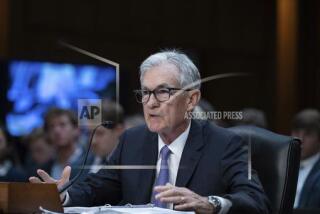IMF Pushes U.S. to Bolster Its Funding
- Share via
The International Monetary Fund called on Congress to give it the money to help stem the slide of Latin American markets if necessary, warning that the U.S. can’t turn away from its leadership of the world financial system.
“There are decisions of enormous importance being made now about the role that the United States plans to take in the global economic system it created in 1945,” Stanley Fischer, the IMF’s first deputy managing director, said in remarks made public Sunday. “It’s no small thing to decide to abandon that system.”
Fischer’s comments come as President Clinton and Treasury Secretary Robert E. Rubin ratchet up their campaign to wring money from a Congress that is critical of the IMF and which claims it botched July’s $22.6-billion bailout of Russia.
The Republican-controlled House of Representatives is balking at providing the $17.9 billion in new money Clinton is seeking for the IMF. The fund’s coffers have been depleted through bailouts it organized for Thailand, Indonesia, South Korea and Russia in the last year.
The White House says that financing the IMF is more crucial than ever as the troubles in Brazil, Latin America’s largest economy, reverberate around the region. Worried about the potential fallout, the stock market there has fallen by almost 50% this year, with other regional markets not far behind.
Brazil, which raised its key interest rate 20 percentage points Friday, is trying to stem an outflow of dollars that’s exceeding $1 billion a day. Investors are worried that budget deficits and shortages of currency reserves there and in other countries will hamper the ability to repay debts.
Fischer is also setting the stage for debate at the annual meetings of the IMF and its sister organization, the World Bank, which begin in a few weeks. In rallying support, the IMF and its backers are trying to walk the line between defending the cash-strapped lender while yielding some ground to critics.
Fischer rejected arguments that the IMF and the World Bank be abolished. Instead, the two organizations need to be fully funded and should work more closely with emerging-market economies and other countries to keep capital flows open and undertake economic reforms, he said.
Still, in a nod to the IMF’s opponents in Congress, Fischer said international lenders need to consider more carefully the possibility that doling out money to indebted nations could delay reforms rather than speed them--the so-called “moral hazard” argument.
The deepening of Asia’s financial crisis is forcing some radical policy changes by governments, some of which are spurning the open-market/high interest rate medicine traditionally advocated by the IMF. Malaysia has imposed currency controls and reduced interest rates, while Hong Kong--regarded as the free-market stronghold of Asia--spent an estimated $12.5 billion to prop up its stock market last month.
*
Fischer said the IMF has only between $5 billion and $9 billion available now for lending. Beyond that, it can tap a line of credit with the major industrial nations, and will do so if necessary to support Latin America, he said. There’s about $15 billion left in that pool, and it would be the second time in just two months the IMF would be drawing on the reserve. It did so to get most of the money for Russia--the first time in almost a generation the IMF had to tap the credit.
“The situation in the global economy is, unfortunately, becoming very difficult and the Fund’s resources are limited,” Fischer said.
The IMF disbursed $26 billion in the year ended March 31, almost four times the amount lent a year earlier. Since then, another $11 billion has been dispatched. Further, countries such as Pakistan are seeking additional loans from the IMF.
Fischer dismissed calls that the IMF be scrapped and a new economic system be built to replace the post-World War II organization founded at the Bretton Woods conference in 1944. That system isn’t broken, Fischer said. What’s more, it will be tough to replace the IMF and the World Bank even if the need were there, he said.
“You have existing institutions in place; you are not at the end of a world war--or Great Depression--which totally destroyed the foundations of the world economy, as was the case at Bretton Woods,” Fischer said. “The system could be operating much better, but basically the system is a reasonable one, one that needs improving.”
Not so, argued Harvard professor Jeffrey Sachs in an article published in the latest edition of the Economist. The U.S., the IMF’s largest shareholder, has bungled its postwar attempt to shape the world economy, Sachs wrote.
He called for a summit of the Group of Eight nations plus developing countries such as South Africa, India, Brazil and South Korea to revamp the system. Aid should be channeled through regional forums like the Assn. of Southeast Asian Nations that could more effectively pressure members to reform, Sachs wrote.
More to Read
Sign up for Essential California
The most important California stories and recommendations in your inbox every morning.
You may occasionally receive promotional content from the Los Angeles Times.













